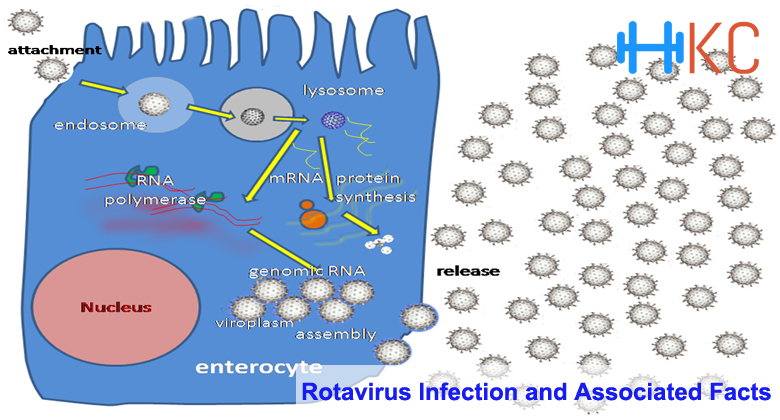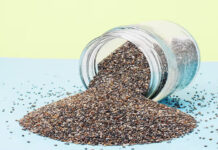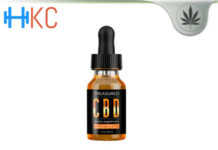Rotavirus primarily affects the stomach and intestines i.e., the gastrointestinal system by causing a condition named gastroenteritis. This can lead to severe diarrhea in the affected individuals. Unvaccinated children are highly prone to get infected with this virus at an early age itself. Rotavirus can cause multiple infections based on the various strains which may occur.
The major risk factor of it is that Rotavirus infection is largely contagious. The incubation period for the virus is a minimum of two days. Rotavirus infection and symptoms can typically subside in 3 to 9 days.
How Does This Virus Spread?
Rota-virus seems to be present in the intestines of an infected person and it could pass out in stools. It could spread easily from an infected individual to another, thanks to close contact. This is mostly because the Rotavirus is present in the infected individual’s hands after he had gone to the toilet. In the case of smaller children wearing diapers and nappies, it could be spreading from the hand of the infected individual who is changing the child’s diapers or nappies. Objects or surfaces that have been touched by the infected individual would facilitate the virus to get transmitted easily to others. Rotavirus could be transmitted if the infected individual cooks food. Rotavirus could be affecting a large number of people in schools or nurseries. It would be taking around 48 hours for symptoms to develop after your first contact with the virus. This period is often, referred to as, the virus’s incubation period.
Vaccination
The major vaccines in practice for rotavirus are RotaTeq and Rotarix, which need to be taken before 8 months of age.
- RotaTeq (RV5) is usually given three times at age 2 months, 4 months, and 6 months.
- Rotarix (RV1) is given in two doses at 2 months and 4 months.
Vaccination for rotavirus is available from 2006 onwards. Adults may also sometimes get infected with rotavirus, especially in case of HIV infection and with lesser immunity.
The risk factors
As discussed, infants are more prone to getting affected by this disease. As rotavirus is highly contagious, those who stay in close contact with the infected individuals are also at high risk of getting the infection. The children of this age group are at high risk if they are in a daycare setting.
Prior to introducing the vaccination, most of the children used to get affected by rotavirus by the age of three, and after repeated bouts of infection, they naturally got immune to the virus.
Rota-virus infection in adults
Even though most dangerous for children, this infection may occur in adults too regardless of their age. Usually, the healthy adults who get infected with rotavirus will only have minor symptoms, and only the first infection tends to be more severe than subsequent infections. In the case of immune deficiency diseases, sometimes rotavirus infection can be terminal in adults too.
How does the ELISA test work?
When it comes to detecting rotavirus, people tend to have the question as to how does the Elisa test work. ELISA (enzyme-linked immunosorbent assay) kit is available at pharmacies, which can be used to do a qualitative detection of the rotavirus antigen in the stool samples. This assay is very useful to diagnose active rotavirus infection in case of mild to severe gastroenteritis, but this is now used for research purposes only.
Symptoms
The major symptoms of infection are:
- Intermittent fever
- Cough and dizziness
- Intense vomiting
- Watery diarrhea etc
Diarrhea and vomiting can further lead to dehydration too with subsidiary symptoms such as:
- Dry skin
- Lethargy
- Absence of tears
- Sticky mouth
- Sunken eyes and sunken fontanel
- Extreme thirst etc
Treatment of rota-virus
It is your primary care physician who usually treats rotavirus infection. In the case of children, pediatricians and family medicine specialists may also treat it. However, complicated or severe rotavirus infection as in the case of HIV-positive patients, further interventions need to be administered by specialists or intensive-care physicians.
In general cases, rotavirus is not lethal. However, proper care and treatment to alleviate the associated symptoms are important in order to get rid of the troubles associated with rotavirus.
Conclusion
You must not treat Rotavirus infection lightly particularly if you see some symptoms of severe dehydration in your child. The usual symptoms of severe dehydration would be drowsiness, mottled or pale skin, very few wet diapers, cold feet and hands, and fast breathing. This should be treated as a medical emergency and would be requiring immediate medical intervention.
Author Bio: Trudy Seeger is a pathologist. He has conducted a sizeable amount of research on the ELISA kit and the tests involved with it. He recommends a customized enzyme-linked immunosorbent assay kit for the detection of several diseases.
























